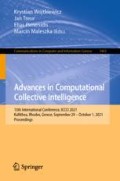Abstract
This article analyzes the problems of monitoring and managing the socio-economic situation. The analysis of the socio-economic situation involves the determination of the quantitative characteristics of the dynamic series, the trend of growth, decline or stabilization, the identification of causal factors, in specific territories and for different groups. The criterion of fuzzy controllability was obtained to solve the problem of forecasting and controlling the socio-economic situation. A mathematical model and algorithm for solving the task of monitoring and managing the socio-economic situation based on interval mathematics and their software implementation are described. The social effect will be expressed in improving the safety of people’s lives. As a result, it will be possible to carry out preventive measures in the necessary territories.
Access this chapter
Tax calculation will be finalised at checkout
Purchases are for personal use only
References
Malykhin, V.I.: Socio-Economic Structure of Society: Mathematical Modeling. UNITY-DANA, Moscow (2003)
Tsybulin, V.G., Khosaeva, Z.K.: Mathematical model of political differentiation under social tension. Comput. Res. Model. 11(5), 999–1012 (2019)
Kapoguzov, E.A., Chupin, R.I., Kharlamova, M.S., Pligunova, A.V.: Social tension factors: estimation and analysis issues (case study: the city of Omsk). J. Sib. Fed. Univ. Humanit. Soc. Sci. 13(4), 517–528 (2020)
Voronov, A.A.: Stability, Controllability, Observability. Nauka, Moscow (1979)
Schroers, B.: Ordinary Differential Equations: A Practical Guide (AIMS Library of Mathematical Sciences). Cambridge University Press, Cambridge (2011)
Bellman, R.E., Zadeh, L.A.: Decision-making in fuzzy environment. Manage. Sci. 17(4), 141–164 (1970)
Verlan, A.F., Sizikov, V.S.: Integral Equations: Methods, Algorithms, Programs. Naukova Dumka, Kiev (1986)
Bairbekova, G, Mazakov, T., Jomartova, S., Nugmanova, S.: Interval arithmetic in calculations. Open Eng. Formerly Central Eur. J. Eng. Editor-in-Chief Noor Ahmed Open Eng. 6(1), 259–263 (2016)
Jomartova, S., Mazakov, T., Karymsakova, N., Zhaydarova, A.: Comparison of two interval arithmetic. Appl. Math. Sci. 8(72), 3593–3598 (2014)
Saaty, T.L.: Relative measurement and its generalization in decision making: why pairwise comparisons are central in mathematics for the measurement of intangible factors - the analytic hierarchy/network process. RACSAM (Rev. R. Spanish Acad. Sci. Ser. A Math.) 102(2), 251–318 (2008)
Griffiths, D.F., Higham, D.J.: Numerical Methods for Ordinary Differential Equations: Initial Value Problems. Springer, London (2010). https://doi.org/10.1007/978-0-85729-148-6
Vaswani, V.: MySQL Database Usage & Administration. McGraw-Hill Osborne Media (2009)
Acknowledgements
The work was carried out at the expense of the program-targeted funding of scientific research for 2021–2023 under the project «Development of a national system for assessing risks and threats to national security of the Republic of Kazakhstan».
For citations of references, we prefer the use of square brackets and consecutive numbers. Citations using labels or the author/year convention are also acceptable. The following bibliography provides a sample reference list with entries for journal articles [1], an LNCS chapter [2], a book [3], proceedings without editors [4], as well as a URL [5].
Author information
Authors and Affiliations
Editor information
Editors and Affiliations
Rights and permissions
Copyright information
© 2021 Springer Nature Switzerland AG
About this paper
Cite this paper
Jomartova, S., Mazakov, T., Mukhaev, D., Mazakova, A., Tolegen, G. (2021). Intelligent System for Assessing the Socio-economic Situation in the Region. In: Wojtkiewicz, K., Treur, J., Pimenidis, E., Maleszka, M. (eds) Advances in Computational Collective Intelligence. ICCCI 2021. Communications in Computer and Information Science, vol 1463. Springer, Cham. https://doi.org/10.1007/978-3-030-88113-9_35
Download citation
DOI: https://doi.org/10.1007/978-3-030-88113-9_35
Published:
Publisher Name: Springer, Cham
Print ISBN: 978-3-030-88112-2
Online ISBN: 978-3-030-88113-9
eBook Packages: Computer ScienceComputer Science (R0)

